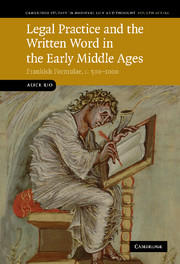Book contents
- Frontmatter
- Contents
- List of tables
- Acknowledgements
- List of abbreviations
- INTRODUCTION
- Part I Formulae, Charters and the Written Word
- Part II Inventory of the Evidence
- Part III Formulae as a Historical Source: Limits and Possibilities
- CONCLUSION
- Appendix A handlist of manuscripts
- Bibliography
- Index
- Manuscript Index
CONCLUSION
Published online by Cambridge University Press: 14 August 2009
- Frontmatter
- Contents
- List of tables
- Acknowledgements
- List of abbreviations
- INTRODUCTION
- Part I Formulae, Charters and the Written Word
- Part II Inventory of the Evidence
- Part III Formulae as a Historical Source: Limits and Possibilities
- CONCLUSION
- Appendix A handlist of manuscripts
- Bibliography
- Index
- Manuscript Index
Summary
Some of the discussion in the earlier chapters of this book may have seemed overly negative: the essential problems involved in the use of formulae as sources, such as determining their authors, exact date or place of origin, have not been resolved; if anything, they have been reinforced, since I have argued that such information is even more difficult to establish than tends to be allowed for. Not only are these problems still there, they are also impossible to solve: the local context of formulae is simply irrecoverable. These problems, however, are not so critical as to prevent us from exploiting formulae in other ways. Acknowledging the ambiguities created by this source-material, and recognising that it is far from telling us all that we would wish to know, does not imply that formulae can be dismissed altogether, as long as we do not expect them to tell us everything – after all, no source ever does. We may not know the authorship, date or place of origin of most of our texts, but even if we could know them, they would not give us the whole story. Instead of treating them like second-rate charters, one needs to go beyond the context of production of formulae in order to appreciate their possibilities more fully: in other words, to take advantage of their capacity to generalise from individual occurrences, and to document expectations for the future as well as isolated cases.
- Type
- Chapter
- Information
- Legal Practice and the Written Word in the Early Middle AgesFrankish Formulae, c.500–1000, pp. 238 - 240Publisher: Cambridge University PressPrint publication year: 2009



